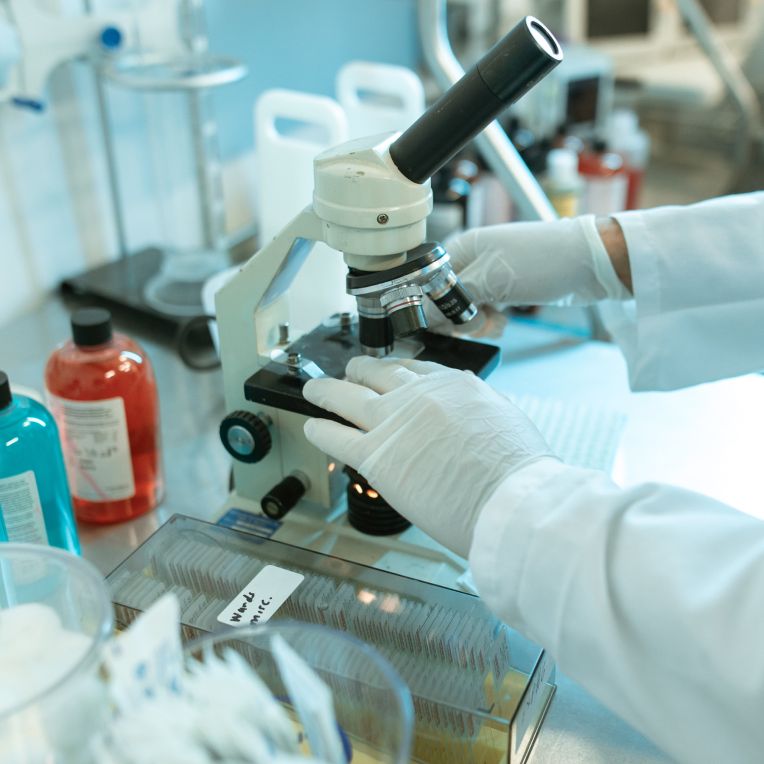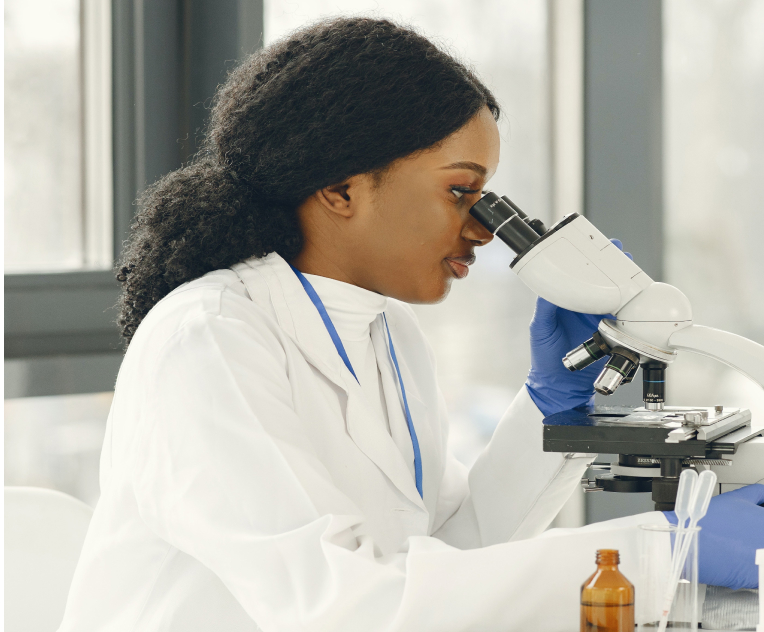KATIE IRWIN
Katie Irwin earned the Toffler Scholar Award in 2022 at Johns Hopkins University
Biography
Katie Irwin grew up 30 minutes outside of Atlanta, Georgia, in a place called Berkeley Lake, and graduated from Greater Atlanta Christian School. She has one brother, Andy, who is almost three years her senior. Irwin’s mother earned a degree in electrical engineering, and later became a schoolteacher when Katie and Andy were young. Irwin’s father, who is from Atlanta, is a pilot for Delta Airlines.
Irwin loved math and science from an early age. She also loved soccer. Once when her mother was driving her and a teammate home from soccer practice, the teammate asked Irwin what she wanted to do one day. Irwin replied that she didn’t know, but she wanted “something having to do with the brain.” Her mother was surprised by her out-of-the-blue response, but Irwin’s declaration turned out to be prophetic.
Irwin and her brother both attended the University of Georgia. The siblings majored in sciences and entered healthcare fields—but they diverged in their areas of focus. Andy minored in public health and now works in healthcare finance. Irwin pursued a degree in biology with a neuroscience emphasis. She decided to explore both research and patient care.
Pivotal undergraduate experiences led Irwin to study neurodegenerative diseases. She performed volunteer work with patients experiencing dementia and worked in a developmental neuroscience lab. She held two internships with the Global Brain Health Institute (GBHI); one experience was in Dublin, Ireland, and the other in San Francisco, California.
![Katie-Irwin [Johns Hopkins] Working to develop biomarkers related to the loss of function of TDP-43](https://tofflertrust.org/wp-content/uploads/2022/12/Katie-Irwin.jpg)
At GBHI, Irwin studied dementia and wrote a first-author review of the evidence for early cognitive and structural brain changes and pathological Alzheimer’s disease-related processes in midlife. Until this experience, Katie had little exposure to information about Alzheimer’s and other dementias, and she discovered she had a passion for these areas of neuroscience.
Today, Katie Irwin is in the Medical Scientist Training Program in the Solomon H. Snyder Department of Neuroscience at Johns Hopkins University School of Medicine. She is pursuing both a clinical degree (MD) and a doctoral (research) degree.
“Going to college, I knew there were two main routes I could take within neuroscience—the clinical route or the research route. As I explored both, I realized I loved both. I couldn't imagine a career in which I could only do one of them.”
– Katie Irwin
![Katie-Irwin [Johns Hopkins] Working to develop biomarkers related to the loss of function of TDP-43](https://tofflertrust.org/wp-content/uploads/2022/12/Katie-Irwin.jpg)
Biography
Katie Irwin grew up 30 minutes outside of Atlanta, Georgia, in a place called Berkeley Lake, and graduated from Greater Atlanta Christian School. She has one brother, Andy, who is almost three years her senior. Irwin’s mother earned a degree in electrical engineering, and later became a schoolteacher when Katie and Andy were young. Irwin’s father, who is from Atlanta, is a pilot for Delta Airlines.
Irwin loved math and science from an early age. She also loved soccer. Once when her mother was driving her and a teammate home from soccer practice, the teammate asked Irwin what she wanted to do one day. Irwin replied that she didn’t know, but she wanted “something having to do with the brain.” Her mother was surprised by her out-of-the-blue response, but Irwin’s declaration turned out to be prophetic.
Irwin and her brother both attended the University of Georgia. The siblings majored in sciences and entered healthcare fields—but they diverged in their areas of focus. Andy minored in public health and now works in healthcare finance. Irwin pursued a degree in biology with a neuroscience emphasis. She decided to explore both research and patient care.
Pivotal undergraduate experiences led Irwin to study neurodegenerative diseases. She performed volunteer work with patients experiencing dementia and worked in a developmental neuroscience lab. She held two internships with the Global Brain Health Institute (GBHI); one experience was in Dublin, Ireland, and the other in San Francisco, California.
At GBHI, Irwin studied dementia and wrote a first-author review of the evidence for early cognitive and structural brain changes and pathological Alzheimer’s disease-related processes in midlife. Until this experience, Katie had little exposure to information about Alzheimer’s and other dementias, and she discovered she had a passion for these areas of neuroscience.
Today, Katie Irwin is in the Medical Scientist Training Program in the Solomon H. Snyder Department of Neuroscience at Johns Hopkins University School of Medicine. She is pursuing both a clinical degree (MD) and a doctoral (research) degree.
“Going to college, I knew there were two main routes I could take within neuroscience—the clinical route or the research route. As I explored both, I realized I loved both. I couldn't imagine a career in which I could only do one of them.”
– Katie Irwin

Research Focus
Challenges
According to Alzheimer’s Disease International, 55 million people worldwide are living with dementia. There are many types of dementia, and Alzheimer’s disease is the most common. Referred to as “the other pandemic,” Dementia’s impact is myriad and severe for families and their loved ones who have the condition.
Katie Irwin’s thesis examines the loss of function of TDP-43, a protein that is the main pathological hallmark of ALS (Lou Gehrig's disease) and a significant percentage of frontotemporal dementia cases, and also occurs in many Alzheimer’s disease cases.
If someone were to develop a treatment for the loss of TDP-43, there wouldn’t be a way to measure the benefit of the therapy beyond what a doctor could observe from a patient on the outside. Biomarkers are needed to study the success of TDP-43 treatments in clinical trials and enable clinicians to see what is happening inside patients.

Focus and Priorities
Irwin is working to develop biomarkers related to the loss of function of TDP-43.
The TDP-43 protein is normally in the nucleus of cells. However, in ALS and certain dementias, TDP-43 is cleared from the nucleus and accumulates in the cytoplasm, meaning it can no longer serve its important functions in the nucleus.
Irwin and her team don’t fully know why or when TDP-43 leaves the nucleus, but they are confident that this is a relevant feature of the neurodegenerative diseases they study. They believe biomarkers—substances that can detect the presence of disease or infection—can be developed to identify loss of function of TDP-43
and that these biomarkers could be used to diagnose patients in the early stages of neurodegenerative disease like ALS, allowing these individuals to receive important treatments earlier. These biomarkers could also classify Alzheimer’s disease cases into those who possess TDP-43 pathology and those who do not, as these individuals may need different treatment approaches.
Currently, Irwin and her team extract these biomarkers from spinal fluid. Eventually, they hope to develop biomarkers for blood. Irwin is using an assay or test that allows her team to use antibodies to pull certain TDP-43-related proteins out of biological fluids so that they can quantify them.

Benefits
Research teams around the world are investigating cures for dementia and Alzheimer’s disease. Researchers like Irwin are working to close knowledge gaps.
Irwin hopes to one day look back on this project and see that it has had a translational impact on medicine and on humanity. She envisions her research as clinically minded and hopes it will someday provide practical approaches to patient care.
Karen Toffler Charitable Trust Investment
Support from the Karen Toffler Charitable Trust Investment will help Irwin and her team test biomarkers in important ways. Her team requires cerebral spinal fluid (CSF) in which to test. CSF is hard to come by and can be quite expensive depending on the source. The fluid is taken whenever a patient has a lumbar puncture procedure. This procedure is not something patients are keen on experiencing multiple times. Toffler Scholar funds will help with the acquisition of more CSF samples.
Irwin describes the creation of biomarkers as a game of numbers. Researchers want the test results they receive to be reliable and reproducible. Also, researchers need to understand exactly what test results reflect. The goal for Irwin’s biomarker isn’t simply to test for the presence of disease. She believes their biomarkers could potentially have more functions. With Toffler Scholar funds, the research group can tackle questions of whether biomarkers are going up or down over time, or whether one biomarker has a relationship to another biomarker they already know about. More samples can help them answer more questions. The more patterns they identify, the more useful their biomarkers will be for clinicians and patients.
Karen Toffler Charitable Trust Investment
Support from the Karen Toffler Charitable Trust Investment will help Irwin and her team test biomarkers in important ways. Her team requires cerebral spinal fluid (CSF) in which to test. CSF is hard to come by and can be quite expensive depending on the source. The fluid is taken whenever a patient has a lumbar puncture procedure. This procedure is not something patients are keen on experiencing multiple times. Toffler Scholar funds will help with the acquisition of more CSF samples.
Irwin describes the creation of biomarkers as a game of numbers. Researchers want the test results they receive to be reliable and reproducible. Also, researchers need to understand exactly what test results reflect. The goal for Irwin’s biomarker isn’t simply to test for the presence of disease. She believes their biomarkers could potentially have more functions. With Toffler Scholar funds, the research group can tackle questions of whether biomarkers are going up or down over time, or whether one biomarker has a relationship to another biomarker they already know about. More samples can help them answer more questions. The more patterns they identify, the more useful their biomarkers will be for clinicians and patients.
“When something goes wrong in the brain, it's hard to separate yourself from what’s happening, particularly with dementias. It’s different compared to something going wrong with your arm or your digestive tract. The brain underlies your identity and how you interact with the world and your loved ones, and how your loved ones can interact with you.”
– Katie Irwin